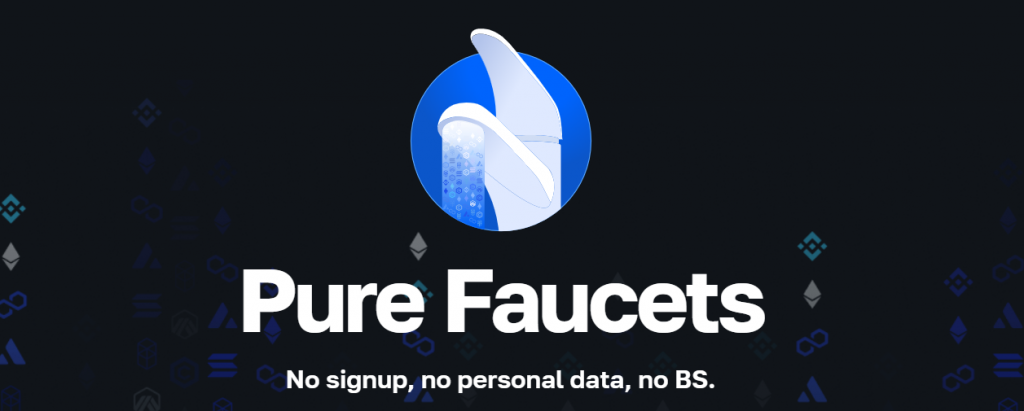[ad_1]

Are you intrigued by the idea of creating your own decentralized application (dapp) but find yourself concerned about navigating the complex intricacies and potential challenges of Web3? If this is the case, then you’re exactly where you need to be. In this guide, we simplify the process of building blockchain-based projects. More specifically, we’ll introduce you to the concept of Web3 as a service, which lowers the entry barriers to the Web3 development space, empowering you to build dapps faster, smarter, and more cost-effectively!
Overview
We’ll kickstart today’s guide by going back to basics and covering the ins and outs of Web3. In doing so, we’ll explain what Web3 is and cover some prominent advantages of the decentralized web. From there, we’ll jump straight into the main topic to explore the intricacies of Web3 as a service. Next, we’re going to cover some prominent Web3-as-a-service providers, where you’ll discover that Moralis stands out as the industry’s premier option. Lastly, to top things off, we’ll dive deeper into Moralis’ Web3 API suite to explain how you can use this industry-leading tool to build dapps faster and smarter!
In Moralis’ premier suite of Web3 APIs, you’ll find several prominent interfaces for multiple different use cases. Consequently, when working with Moralis, you can build everything from NFT marketplaces to token explorers without breaking a sweat.
Also, did you know that you can sign up with Moralis for free? As such, take this opportunity to create your account right now and get access to our entire suite of industry-leading Web3 development tools!
Nevertheless, without further ado, let’s dive straight into it and explore the intricacies of Web3!
What is Web3?
Web3 is the most recent iteration of the internet, and it refers to a new and improved decentralized version of the web. Web3 introduces the notion of decentralization by utilizing three core technologies: blockchains, smart contracts, and decentralized applications (dapps). As such, to further understand what Web3 entails, let’s explore these three components one by one!

- Blockchain Networks: In short, blockchain networks are decentralized and distributed ledgers responsible for recording transactions across a network of computers. A blockchain network comprises a chain of blocks (hence the name), each containing a list of transactions and the previous block’s hash. As soon as a new block is added to the chain, it becomes immutable. Consequently, blockchain networks can facilitate transparent, trustless, and tamper-resistant transactions.
- Smart Contracts: Smart contracts are self-executing programs running on blockchain networks like Ethereum, BNB Smart Chain (BSC), and Polygon. These programs automatically run whenever predetermined conditions are met, making them perfect for automating the execution of agreements and business logic. Consequently, they remove the need for intermediary involvement in transactions on blockchain networks.
- Dapps: Dapps are a big part of Web3, and they represent a new generation of web-based applications built using decentralized technologies such as blockchain networks and smart contracts. However, dapps aren’t all that different from conventional applications as they serve the same purpose and provide similar functionality. The main difference is that dapps are decentralized, meaning they are free from the influence and control of central authorities.
All in all, Web3 is a new, more secure, transparent, and user-centric generation of the internet built using blockchain networks, smart contracts, and dapps!
For a more in-depth explanation of the decentralized web, check out our guide on Web3 technology!
What are the Benefits of Web3?
Now, with an overview of Web3, let’s explore the benefits of the decentralized web to better understand why it’s proliferating and gaining increased adoption. Here are four prominent examples:
- Higher Security: Web3 platforms are decentralized, removing the single point of failure that many conventional apps have. Consequently, dapps are more secure and resistant to cyber-attacks.
- Trustless: Trustlessness is a core principle of blockchains, dapps, and smart contracts. And it means you don’t have to rely on and trust third parties, such as banks, a person, or any other intermediary. Instead, the system creates trust for you.
- Cost-Efficient: Web3 disrupts conventional business models by removing the need for unnecessary intermediaries. Consequently, it allows you to streamline processes and reduce overhead costs when building Web3-based apps.
- Permissionless: Web3 is permissionless, meaning that there’s no central authority regulating who can use the various blockchain networks. Consequently, anyone from anywhere worldwide can participate in this open ecosystem.
Nevertheless, that covers four prominent benefits of Web3. In the following section, we’ll jump into the main topic and explore Web3 as a service!
What is Web3 as a Service?
Web3 as a service refers to providing accessible technologies and foundational blockchain infrastructures for developers and businesses, facilitating easier Web3 development.
Now, since developing Web3 projects share numerous parallels with conventional app development, if you’re a developer transitioning into the blockchain space, your skill set provides a helpful foundation. However, there are also many differences – especially when it comes to backend development – that pose challenges for newcomers. Fortunately, it’s possible to overcome these hurdles and abstract away some complexities by tapping into Web3-as-a-service solutions!

But what exactly is Web3 as a service? And why should you use it?
Web3 as a service is an umbrella term for providing technologies and underlying blockchain infrastructures you, other developers, and businesses can use to make Web3 development significantly more accessible. In short, it allows you to effortlessly leverage the capabilities and benefits of Web3 without dealing with the underlying complexities of setting up and maintaining the required infrastructure.
In addition, Web3-as-a-service providers typically offer various tools, application programming interfaces (APIs), and other services that simplify the development and deployment of dapps and Web3 platforms. This includes everything from running and managing nodes to providing the necessary technology for communicating with the various blockchain networks.
All in all, by utilizing Web3-as-a-service providers, you, other developers, and Web3 startups can focus on building your projects without having to deal with unnecessary underlying complexities. In doing so, you free up a lot of time to focus on other aspects of your dapps, such as improving the user experience, providing additional features, etc.
Nevertheless, with an overview of the concept, let’s break down the benefits of Web3 as a service in the next section!
Why Use Web3 as a Service?
Now, with the basics of what Web3 as a service entails, you might be asking yourself, ”Why should I leverage a Web3-as-a-service solution?”. Well, to answer this question, let’s look at three prominent benefits of using services like these:
- Lower Entry Barriers: Using Web3-as-a-service solutions removes the most bothersome complexities of building Web3 projects. This, in turn, lowers the barriers to entry, allowing you to build dapps more seamlessly without having to get into the nitty-gritty details and learn how everything works from scratch.
- Save Time: Setting up the required infrastructure to run and manage dapps is a complicated and time-consuming endeavor. Fortunately, you can bypass this and save time by leveraging a Web3-as-a-service provider that does it for you. In return, you gain the freedom to redirect your time and efforts toward other aspects of your projects, such as enhancing the UX or implementing more sophisticated features.
- Cost-Efficient: By enabling you to save time, Web3 as a service additionally improves the cost efficiency of your development endeavors, providing a greater return on your investment.
Nonetheless, that covers three benefits of leveraging Web3-as-a-service solutions. Let’s now dive into some concrete examples of prominent providers!
Web3-as-a-Service Providers – Build on Web3
There are multiple types of Web3-as-a-service providers offering various solutions for making Web3 development more accessible. However, in this section, we’ll specifically look at a list of API providers, as they typically give you most of what you need when building dapps. More specifically, we’ll briefly explore the following three Web3-as-a-service providers: Moralis, Alchemy, and Quicknode!
Moralis
Moralis was founded in 2021 and is the industry’s #1 Web3-as-a-service provider, offering a premier suite of cross-chain compatible Web3 APIs for any use case. Consequently, with Moralis, you can effortlessly build any type of dapp across all the biggest blockchains, including Ethereum, BSC, Polygon, Arbitrum, Optimism, Gnosis, Solana, and many others!

Thanks to the accessibility and breadth of Moralis’ Web3 APIs, you can seamlessly get and integrate any Web3 data and functionality into your projects with only a few lines of code. This includes everything from straightforward wallet balances to complex market data and much more.
All in all, Moralis removes the underlying complexities of Web3 development, allowing you to build dapps more seamlessly and take full advantage of the benefits of leveraging a Web3-as-a-service provider!
Alchemy
Alchemy is a Web3-as-a-service provider that first launched back in 2017, and the platform equips developers with the required tools to easily build dapps and other blockchain projects. In their toolkit, you’ll find a range of cross-chain compatible interfaces – such as the Alchemy NFT API – supporting several prominent blockchain networks, including Ethereum, Polygon, Optimism, and others. And with these tools, it’s possible for developers to seamlessly get and integrate blockchain data into their Web3 projects!
QuickNode
QuickNode launched in 2017, and it’s another prominent Web3-as-a-service provider offering Web3 developer and infrastructure tools. And with QuickNode’s blockchain APIs, you can build dapps faster and more efficiently as you don’t have to deal with any underlying complexities.
What’s more, just like Moralis, QuickNode also supports most major blockchain networks, including Ethereum, Polygon, BSC, Arbitrum, Avalanche, and others!
If you’d like to explore other alternatives, check out the Web3 service providers page on Moralis’ Web3 Wiki!
Nevertheless, that briefly covers three prominent examples. In the next section, we’ll return to Moralis to explain why it stands out as the industry’s premier option among the top Web3-as-a-service providers!
Exploring the #1 Web3-as-a-Service Provider: Moralis
Moralis is the industry’s #1 Web3-as-a-service provider, and with our premier Web3 data tools, you get instant access to cross-chain data for NFTs, wallets, tokens, prices, and much more. No indexing is required. Consequently, when working with Moralis, it has never been easier to build Web3 projects!

Moralis’ industry-leading suite of Web3 APIs comprises multiple interfaces for various use cases, and below, you’ll find three prominent examples:
- Wallet API: Moralis’ Wallet API supports 500+ million addresses across all major blockchain networks. With only single lines of code, you can use this interface to get balance, transfers, NFTs, etc., of any wallet. As such, this is the perfect tool for crypto wallet development.
- NFT API: With the NFT API, you can effortlessly fetch metadata, balances, transfers, etc., using only single API calls. And this makes it the industry’s premier tool for NFT data.
- Streams API: With Moralis’s Streams API, you can effortlessly set up streams to get instant, customizable updates sent directly to the backend of your projects via webhooks whenever important on-chain events trigger. As such, this is the easiest way to set up real-time Web3 alerts to keep your users up to date.
Nevertheless, that only covers three examples. If you’d like to explore all our premier interfaces, check out our Web3 API page!
Why is Moralis the Industry’s Premier Web3-as-a-Service Provider?
At this point, you might be asking yourself, ”Why should I use Moralis as my Web3-as-a-service provider?”. Well, to answer this question, let’s look at three benefits of Moralis!
- Top Performance: Moralis’ APIs are the best in the business. It doesn’t matter if you measure by reliability, pricing, speed, or any other metric – our interfaces continuously outperform the competition.
- Cross-Chain Compatability: Moralis’ APIs are chain agnostic, supporting all major chains, including Ethereum, Polygon, BSC, etc. Consequently, with Moralis, it has never been easier to build cross-chain compatible dapps.
- Trusted By Industry Leaders: Moralis’ APIs are trusted by industry leaders, including MetaMask, Polygon, Opera, Blockchain.com, and many others.

So, if you want to leverage the best Web3-as-a-service provider, don’t forget to sign up with Moralis. You can create an account free of charge, and you’ll get instant access to all our premier interfaces!
Summary: What is Web3 as a Service? – Exploring the #1 Web3-as-a-Service Provider
In today’s article, we explored the ins and outs of Web3 as a service. And in doing so, we learned that it is an umbrella term for the provisioning of tools and technologies that make Web3 development more seamless. These solutions remove the complexities of blockchain development, allowing you to build dapps smarter and more efficiently!
In addition to exploring the concept of Web3 as a service, we explored some prominent providers where we learned that Moralis stands out as the industry’s premier option!
In Moralis’ industry-leading suite of Web3 APIs, you can find interfaces like the Wallet API, NFT API, Streams API, etc. With these tools, you can effortlessly build everything from Web3 wallets to NFT marketplaces with ease.
If you liked this guide, consider checking out more of our content here on Moralis. For instance, read about blockchain infrastructure as a service, explore the best Ethereum API, or learn about DeFi dapp development!
Also, did you know that Moralis offers tools beyond the Web3 APIs? A great example is the testnet faucets page, where you’ll find pure faucets for all major testnets. For instance, if you’re interested in Polygon development, check out our MATIC faucet guide to learn more.

If you want access to all our industry-leading development tools, don’t forget to sign up with Moralis. You can create an account free of charge, and you’ll immediately be able to build dapps both faster and smarter!
[ad_2]
Read More: moralis.io








 Bitcoin
Bitcoin  Ethereum
Ethereum  Tether
Tether  XRP
XRP  Solana
Solana  USDC
USDC  TRON
TRON  Dogecoin
Dogecoin  Lido Staked Ether
Lido Staked Ether  Cardano
Cardano  Wrapped Bitcoin
Wrapped Bitcoin  Hyperliquid
Hyperliquid  Wrapped stETH
Wrapped stETH  Sui
Sui  Bitcoin Cash
Bitcoin Cash  Chainlink
Chainlink  LEO Token
LEO Token  Stellar
Stellar  Avalanche
Avalanche  Toncoin
Toncoin  USDS
USDS  WhiteBIT Coin
WhiteBIT Coin  Shiba Inu
Shiba Inu  Wrapped eETH
Wrapped eETH  WETH
WETH  Litecoin
Litecoin  Hedera
Hedera  Binance Bridged USDT (BNB Smart Chain)
Binance Bridged USDT (BNB Smart Chain)  Monero
Monero  Ethena USDe
Ethena USDe  Polkadot
Polkadot  Bitget Token
Bitget Token  Coinbase Wrapped BTC
Coinbase Wrapped BTC  Uniswap
Uniswap  Pepe
Pepe  Pi Network
Pi Network  Aave
Aave  Dai
Dai  Ethena Staked USDe
Ethena Staked USDe  Bittensor
Bittensor  OKB
OKB  BlackRock USD Institutional Digital Liquidity Fund
BlackRock USD Institutional Digital Liquidity Fund  Aptos
Aptos  Internet Computer
Internet Computer  Cronos
Cronos  NEAR Protocol
NEAR Protocol  Jito Staked SOL
Jito Staked SOL  sUSDS
sUSDS  Ethereum Classic
Ethereum Classic